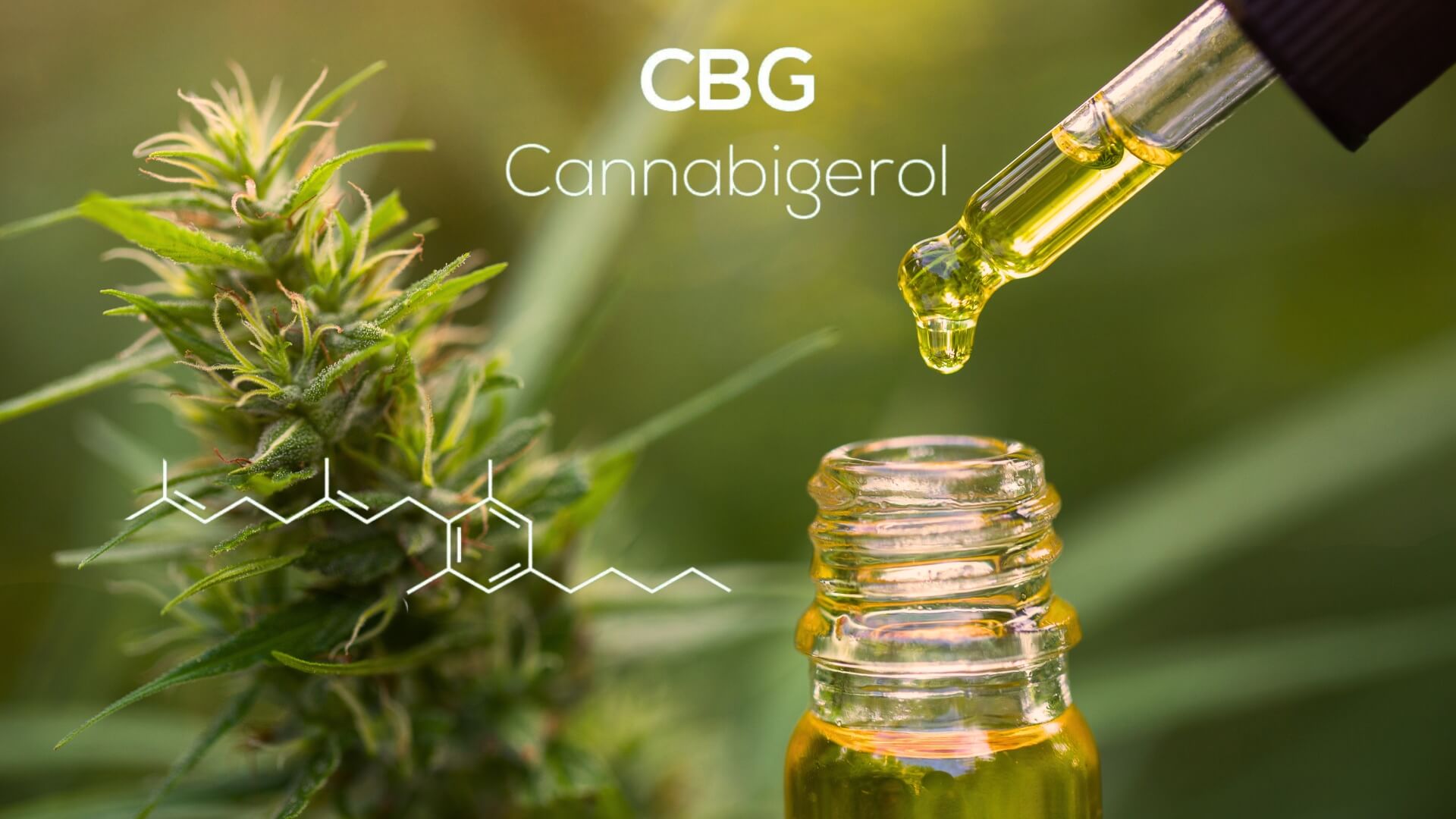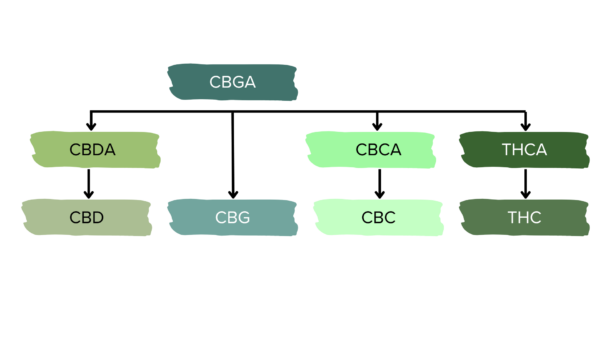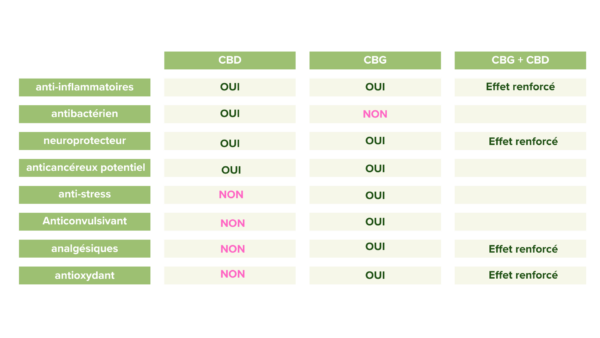Have a question? 06 70 73 89 02
🔞 Not for sale to under 18s
🔥 It's our anniversary: 30% off with the code 7YEARS!!! 🥳 ( excluding accessories and gummies)
Have a question? 06 70 73 89 02

Do you know CBG? Cannabigerol is a primary cannabinoid that is attracting increasing attention. Nicknamed the mother cannabinoid, it plays a key role in the synthesis of other cannabinoids such as CBD and THC.
CBG acts directly on CB1 and CB2 receptors, offering unique potential benefits: anti-inflammatory, antibacterial, neuroprotective and even anticancer effects.
But what are its real effects? How does it compare with CBD? How can it be used effectively? Find out everything you need to know about CBG, its benefits and how best to use it in this article.
Cannabigerol is one of the major cannabinoids naturally secreted by hemp and cannabis. To most people, CBG pales in comparison to other cannabinoids. It doesn't have the notoriety of CBD, nor the soaring effects of THC. Yet, without it, neither would be present in cannabis.
CBG is sometimes called the "mother cannabinoid", and rightly so, as it is considered the "precursor" of the other major cannabinoids, at least in its raw, acid form: CBGA.

In fact, it is CBGA that is synthesized first by the plant during its growth. This is then modified by various enzymes which convert most of it into THCA, CBDA and CBCA, the acid forms of THC, CBD and CBC. A small proportion is not converted by the enzymes and is transformed into CBG by decarboxylation. Is CBG in turn transformed into CBG9? Nothing is less certain. But what is certain is that, after this enzymatic conversion, CBG represents only 1% of cannabinoids on average, whereas CBD or THC can exceed 25% in certain varieties.
In terms of effects, CBG is much less well studied than CBD and THC, but a few preliminary studies have nevertheless brought to light a few properties that could prove interesting:
A 2013 study on mice demonstrated that CBG had a positive effect on certain inflammatory bowel diseases such as colitis. Although the evidence for this anti-inflammatory effect has only been proven over a small radius of action, it could prove effective in treating inflammation more generally[1].
Like most other natural cannabinoids, CBG has been shown to have a neuroprotective effect. It has been noted to have a positive impact in the prevention and management of Huntington's disease, by reducing its cellular toxicity.
Cannabigerol may also have interesting properties against other neurodegenerative disorders such as Parkinson's or Alzheimer's, but more studies are needed to be sure[2].
A 2008 study by an Italian-British team investigated the antibacterial properties of cannabinoids. The study demonstrated that certain cannabinoids, such as CBG, had an effect comparable to, and sometimes even superior to, that of existing antibiotics against Methicillin-Resistant Staphylococcus Aaureus (MRSA)[3].
In vitro research has shown that CBG can inhibit the growth of certain cancer cells, particularly in the colon. These data were confirmed in animal models, where it reduced colon cancer tumours[4].
Very early in the history of cannabinoid studies, in the early 70s, researchers explored the role of cannabinoids in reducing intraocular pressure. CBG showed a positive impact on intraocular pressure, particularly in cats. These results suggest that CBG has a beneficial effect on glaucoma[5].
It's interesting to compare CBD and CBG for both their similarities and their differences.
CBG accounts for around 1% of total cannabinoids, while CBD can naturally exceed 25% in some varieties.
Another, less visible, but far more interesting difference lies in their mechanism of action. CBD interacts weakly with CB1 and CB2 receptors, but has other mechanisms of action at serotonin receptors (5-HT1A) and vanilloid receptors (TRPV1 and 2) that impact the management and regulation of anxiety, stress and pain.
CBG, on the other hand, has a direct impact on CB1 and CB2 receptors, although it has no psychoactive effect. It is this impact on cannabinoid receptors that leads to the effects mentioned in the previous paragraph.
Although somewhat different, these modes of action can cause similar effects, which can reinforce each other. This is particularly interesting for products in the THM range, since they contain CBG, CBN, CBC and CBDP. A picture being worth 1,000 words, here's a table of the effects of CBG compared with CBD, and those which are reinforced when consumed together:

CBG shows no addictive or habit-forming effects, and causes no high. It is therefore perfectly legal in most European countries, including France, Spain, Italy and Germany.
At least, it follows the same rules as CBD: in France, it's perfectly legalas long as it contains less than 0.3% THC.
With its growing popularity, CBG is being democratized, and the market is getting bigger and bigger. Today, CBG with or without CBD can be found in a multitude of forms.
CBG can be found in oil form, notably in so-called Full Spectrum oils. These full-spectrum oils contain all the natural cannabinoids present in the plant, increasing their potency tenfold. Easy to use, just use the pipette to place a few drops of oil under the tongue.
Here you can find CBG combined with CBD in the form of resins and flowers. These quality products, for infusion or vaporization, promise a delicious moment of relaxation.
If you want to consume "pure" CBG and only CBG, concentrates are for you. In the form of isolates, crumbles or terpsolator, to be consumed by vaporizer, concentrates can be composed of up to 97% CBG!